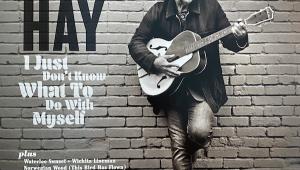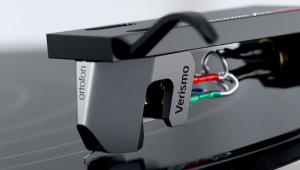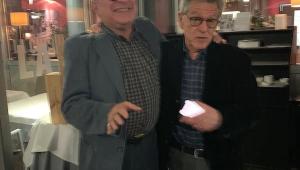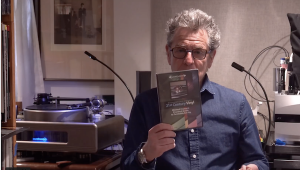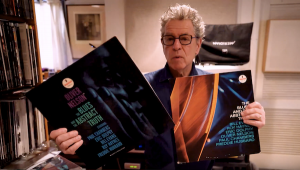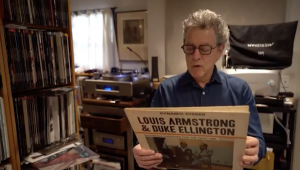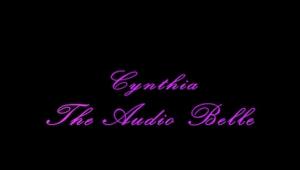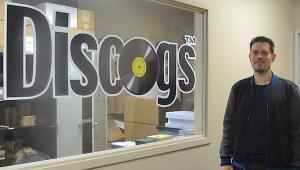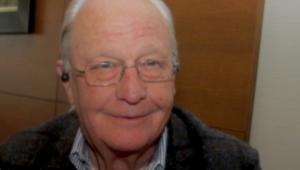Bonnie "Prince" Billy Grants a Rare Interview--Pt. 3
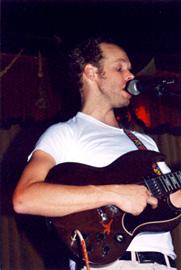
MF: So when are you touring again? When is the next time?
WO: We go to Japan for the first time in March (of 2003).
MF: When in March?
WO: March 10th.
MF: Oh. I’m going to be there until the 8th. Where are you going to play?
WO: We’re playing all over. It’s like ten or 11 days where the show is maybe five or six cities, which is pretty exciting.
MF: Well, that’s too bad. It would be great if --
WO: Yeah, what are you doing over there, working?
MF: Yes. I’m going to visit a plasma television factory. That’s another part of my gig. I write about consumer electronics. I’ve always been a music lover and I was a disk jockey on the radio in Boston, on BCN.
WO: Yeah, you have a good voice for it.
MF: Back when you could play what you want and say what you want and there’s nothing more fun – I was on all night, so I could do anything I want, pull out the records I wanted to play, say here, check this out, check this out, you never heard that before. That’s how I like to express music. To have to write about it is painful.
WO: Exactly. And that’s – every other record at least, like the last record I said – every other record at least I’ll just say no promos. Don’t send them out. And then they’ll be like what about radio, and I’ll be like oh, yeah, radio, yeah, send it out. Because still with these records, 99 percent of them go to college stations where there’s not an audience but the DJs do get to choose what they play, and I think that’s a more valid way of being turned on to music is getting to hear it for yourself and hearing it on the radio rather than reading about it because you’re never going to get the feel for the record and you’re going to end up – even if it’s a good record and a good review, you’re probably going to waste your money if you buy it based on the review because they didn’t communicate – they’re not going to communicate to you why you liked it.
MF: I get review samples and I get the press that comes with it, and some of these reviews are so breathless, and this is the greatest thing since the -- and they throw the names out, which I hate, and then you get it and it’s nothing like they said it was.
WO: Yeah. To you. And to them it totally is – totally – and it isn’t at all – at all.
MF: It’s a terrible job but I have to do it because it’s so hard for people to get their music out there now with Clear Channel and everything. And I’ve got this following that goes back a long time. People trust me and so I try to write it as communicatively as I can to the core audience, which basically covers a whole, wide atrium. It’s really unbelievable. Ten years later I’ll hear thank you for turning me on to XTC. I would never have heard of them otherwise. I get that now. This is ten, 15 years ago. It’s fun and it’s frustrating and I’d rather be a disk jockey but…
WO: I just read the Exploding book (Exploding: The Highs, Hits, Hype, Heroes, and Hustlers of the Warner Music Group) about the Warner Music Group. Have you seen that book?
MF: No.
WO: It’s written by Stan Cornyn.
MF: Stan Cornyn, oh, yeah, I know him.
WO: And so it’s cool. That just reminded me because there’s sections about the Warner reps going to Boston to DJs and going all over the country and dealing with record stores and distributors and DJs, having to deal with DJs, which, you know.
MF: That doesn’t really exist anymore.
WO: Where somebody who ran a record company would know the name of a DJ in Ohio or in Boston, and now it doesn’t matter.
MF: It was great. I was there when Warner Brothers set up its distribution in Boston. They didn’t have distribution at that point. It was all handled by indies. And they would just send the records out. I was there when this guy set up this big plant outside of Boston and it was WEA, Warner-Electra-Atlantic. In fact, where’s my bag, this was the original Atlantic Records – you can see --
WO: Oh, my God!
MF: See Atlantic in there?
WO: Fuckin’ A. That’s so cool.
MF: That was the promo bag that they gave out in ’73.
WO: Oh, wow! That is so cool.
MF: It is cool. ( I ended up giving it to Atlantic Records CEO Craig Kallman when he paid a visit in 2005. He’d never even seen one. I felt he deserved to have it).
WO: I’m going to tell Drag City about that. That’s so awesome.
MF: A bag like that?
WO: Yeah, a leather bag with it pressed in it.
MF: They pressed their logo in there. And over the years it’s gotten weaker and weaker, the pressing sort of fades. You can see it’s fading but it’s still there.
WO: From what year is that probably?
MF: ’73. That’s when I was on the radio. That was back when Peter Frampton was not Peter Frampton as you know him but he was just a guy in the band Camel and he was in Humble Pie. I went to see him with – is Jo Pareles going to talk to you from the Times?
WO: He isn’t, no. But I like his writing.
MF: Yeah, he’s a good guy. But he hates recorded music. Hates it. So I’m trying to deal with him on a --
WO: That’s good because he’s a better live reviewer than he is record reviewer.
MF: Yes, he doesn’t like recorded music and I try to say to him, look, most people can’t afford to go every night and see live music. They should definitely go see live music but you get to see it for nothing.
WO: Right. Financially or time-wise.
MF: Time-wise or just the whole thing is impossible. You can’t even get tickets sometimes. I would love to go see the High Llamas tomorrow night but I can’t do it. So, I was on the radio and I was talking about Peter Frampton. I said you don’t know this guy yet but I think he’s got the potential to be really big. And I was playing the Camel record—not the open shirt crap that was so embarrassing. And he was in Boston and he called me up and said, hey, I heard you talking about me. I’ll come up to the station. So he came up and I interviewed him. Those days are – forget it. That doesn’t exist anymore. So now you have to get the word out as you can. So one thing I wanted to show you – are you familiar with this record at all? (Davy Spillane’s Atlantic Bridge)
WO: No.
MF: The reason I’m bringing this up is because this is a record that features bagpipes. And there’s one cut called “Atlantic Bridge.” It’s got Bela Fleck and Jerry Douglas on it. And this is about a six-minute song that starts in Ireland, the bagpipe music, and over the course of the six minutes it becomes bluegrass, and it just transforms itself. It’s a great record. It’s unbelievable.
WO: Yes. There was a really, really sort of for me like a defining musical event that happened where I met – I was hitching around Scotland and I met a guy that I’d met years before and I was too young to really talk to him at the time. But then we could talk and I had made a tape of some music for his parents, Scottish people who wanted to hear some American country music and bluegrass music, and they were like “would you make me a tape?” So I did. And he was like “that was an awesome tape,” and I was like, “well, I would like to hear some Scottish music because I know that there are things about it that I like but the only things I can find are just bagpipe music that you get at a gift shop and just marches and blah blah blah.” And so I was like “I want to hear something – he said what else do you want to hear?” “I want to hear some – and I was like I also know how great Robert Burns is but I know that I don’t know where to find recordings of how great he is.” So he was like, “okay, I’ll make a tape for you.” And then like six months later he sends me five 90-minute tapes, 90-minute mix tapes, and like 12 pages of notes with everything. And I know that Davy Spillane is on there somewhere, and like Christy Moore is one of his huge heroes. This was a mix of Scottish, English, Irish and Breton. There was a whole side of Breton pipes, which was really cool. But those tapes, I listened to those for a year constantly, constantly, and they were very – that was a huge --
MF: And here’s the connection. And when you hear this one cut it’s great because the connection is bridged in that one song. It just goes “foop.”
WO: And the shit that he put on – like I know because he’s put on stuff that was like reggae music with bagpipes. He put everything on it and he knew everything about these styles of music so he put everything from just a guy singing “Oh, the muckin’ on Georgie Pyre,” to these big live performances at the time when people were getting very excited, probably in the early ‘70s and all through the ‘70s when Irish and Scottish people were excited about bringing different aspects of world music into what they were playing. It’s cool that you brought that Everly Brothers record (Roots) because the hits in the new record that we made and it was partly modeled on The Very Best of the Everly Brothers which has been one of my favorite records as early as I can remember.
MF: That’s the one on Warner Brothers.
WO: It’s on Warner Brothers and they re-recorded all their songs.
MF: By Bill Porter, the engineer. Do you know who he is, Bill Porter?
WO: No.
MF: He is the guy that did all the Roy Orbison albums on Monument, did all the Elvis stuff in Nashville. He’s a genius. In fact he lives in Kentucky now or Missouri.
WO: Is he retired?
MF: He’s retired. He teaches sound.
WO: Ah. Bill Porter?
MF: Bill Porter. He’s a genius. He’s one of my all-time heroes, and he is just the greatest guy. So he did all the re-recordings of the Everly Brothers.
WO: Yeah, so that was one of my – because that’s always been one of my favorite records. I grew up listening to that record and then when I was 12 or 13 and started to hear on oldies radio the Everly Brothers hits I was like there’s something fucked up about those songs. They don’t sound quite right to me. It was because I knew the new version and it’s still one of my favorite records.
MF: Their harmonies are just…
WO: Their harmonies and like the maturity and emotion that they bring to these songs that they know so well is amazing. The songs have more in them than the original hits do on a deep level. The original hits are still totally awesome.
MF: Yes, because they were a little older. Now you’re a little older but this new record just has this – it’s odd. You sound older and more lonely and isolated on the older records and this record there’s just this – and, you know, I think for somebody who has heard all the older records it makes it even more – you get more of a good feeling listening to it. For someone who has never heard it they’re going to hear it and they’re going to like it but it’s just – I’m not interested in your personal life but it sounds like things are good.
WO: It feels good. It feels good to listen to – there are certain times when I listen to this record, certain moments on it where I just well up and think like, oh, this feels good.
MF: Right. Now, do you have any concern that people are going to – I mean packaging and marketing is a fact of life. It’s just confusing name-wise if people are going to wonder what --
WO: Well, I mean I realize – the names were confusing people way too much for my taste because that wasn’t the point of it at all.
MF: Of course it wasn’t.
WO: So then at a certain point I just started making Bonnie “Prince” Billy records and now I’m not going to change that at all.
MF: And it’s spelled two different ways. Is that a typo or is it…
WO: Well, there’s a method to that madness in that it’s like in my little imagination which is that Bonnie Billy is his name, and if it’s his full name with the Prince in the title, Bonnie is his first name, Billy is his last name, and his full name with Prince in the title then it’s i-e at the beginning and if it’s just casually just Bonny Billy hanging out then there’s a-y.
MF: Is there a reason? Is that some kind of convention or is that just something that you came up with, you lucky guy!
WO: It’s sort of just to know that – like if something is too simple then you have to pay attention to it, and if you know already that there’s complexity to it then you just figure I’ll never understand that and then you can think about something else.
MF: Yeah, which is what you want.
WO: Yeah, I mean it’s just like in religion you just want it to be like there’s no way I could ever grasp the whole concept of God and everything that God does and is, so I’m just going to trust that that’s going on and I don’t have to worry about it. I don’t have to go to church on Sundays, all I have to do is pray.
MF: It gets bad when you start – it all turns into evil when you start saying, well, I’m going to take that and make this and you wear this clothing and you have to do this and that’s the root of all evil in the world as far as I’m concerned.
WO: Nobody can think about the name in any way that’s going to bother me because it’s too complex for me to even worry about.
MF: But it becomes an issue, I guess, if the record is going to make it into more of a mainstream audience. I mean this record could be played on any country station.
WO: But all the Bonnie “Prince” Billy records all say Bonnie “Prince” Billy and it’s always spelled the same way, at least on the full-length records, and so --
MF: But they’re still going to wonder where that comes from. So I'm thinking here’s this thing that goes from the United Kingdom which is all about royalty, and somehow there’s this royalty thing – is there any conscious -- or is it unconcious?
WO: I just all of a sudden thought of the name and then I thought, oh, that works on so many levels, yeah, it works on – it carries through somehow because of the royalty thing.
MF: Palace.
WO: Yeah, exactly. But then it’s a different set of consonants all together.
MF: It doesn’t mean anything ultimately.
WO: It means so many things and it’s safe. I was thinking like oh this is perfect, it’s a combination of Bonnie Prince Charlie and Nat King Cole, that’s what I first thought, and that’s all I thought.
MF: But you don’t go out in kilts or anything. You don’t wear any of that stuff, right, you just (use the name).
WO: No, my grandmother’s maiden name was Scott and Oldham is a border town between England and Scotland. Then also Clark is – the three names –
MF: Well, you know that but --
WO: lFor me. It has to just work for me but I think that it rolls off the tongue, you know, it’s sort of funny, it’s sort of an attractive name in its way. It’s a nice combination of consonants and vowels. So I just figured – and it represents an individual so people can be like oh, “who is this Bonnie Prince Billy?” and they see a picture and they’re like, “oh, that must be Bonnie Prince Billy. That’s who is singing these songs.” And it works for them, you know, and they never have to know anything else because it’s not a real person but they don’t have to know that. Like I don’t know – Davy Spillane, his real name could be John Westcott, and this is what he just likes – he likes to be known as Davy Spillane, put on here, or Mark Twain or whatever. Mark Twain is Mark Twain.
MF: And that’s not really Mark Twain. I thought were who they are and they aren’t, as it turns out, but it doesn’t really matter. It’s not Toby Keith, it’s not all these kinds of names, so they’re going to look at it in a regular kind of station and say so what are we supposed to do with this guy?
WO: Yeah, exactly. We’ll see how mainstream Nashville radio deals with it.
MF: Just play the music, play the damn music. Okay, well, you know, this has been fun and fine and it will help me to write and there will be good quotes in here. We talked about a lot of interesting stuff and I’m sure you’d like to have a little break between now and the next session.
---END----


